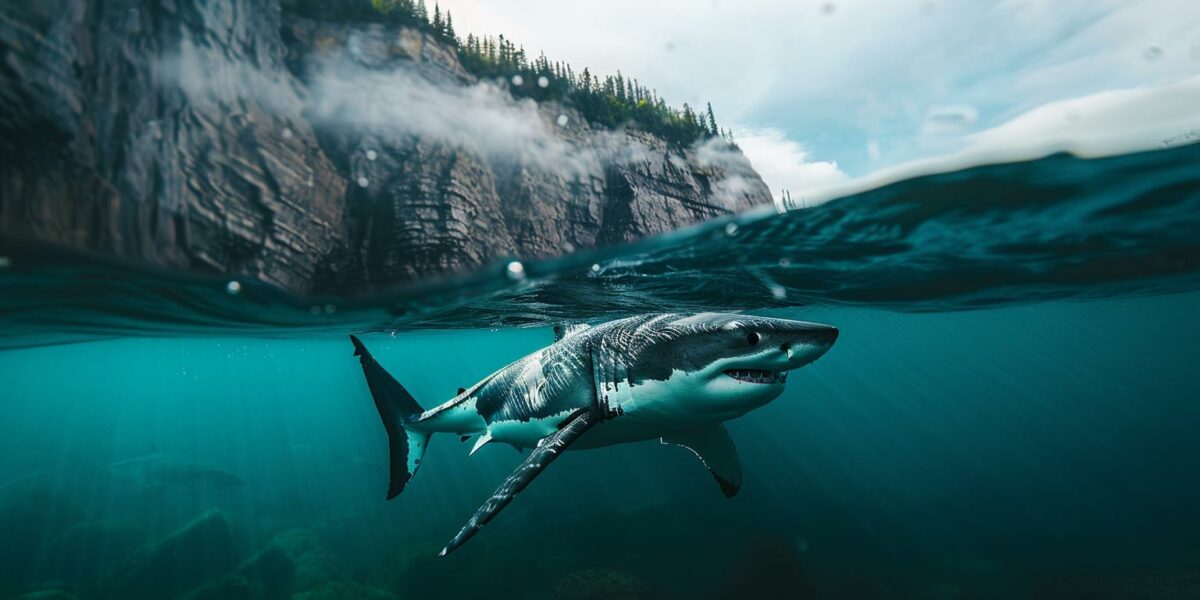Climate Change Drives the Northern Migration of Sharks
Sharks are increasingly venturing into Canadian waters as a result of rising ocean temperatures caused by climate change. This trend is particularly evident along the eastern seaboard, where great white, tiger, and blacktip sharks are more frequently spotted near the shore.
The northward movement of these predators signifies a shift in marine ecosystems. As the ocean warms, sharks can now inhabit regions that were previously too cold for them, leading to increased human-shark interactions.
Dr. Stephen Kajiura from Florida Atlantic University stresses the importance of public awareness regarding these new marine inhabitants. He notes that many sharks are found close to beaches, where people swim, increasing the likelihood of encounters.
Historically rare in northern waters, sharks are now a common sight. Evidence suggests a rise in the population of great white sharks along Canada’s East Coast, indicating a significant change in the region’s marine biodiversity.
Sharks as Indicators of a Healthy Ecosystem
Despite the potential risks, experts like Neil Hammerschlag from the Shark Research Foundation view the increased presence of sharks as a positive sign. He believes it reflects a healthy marine ecosystem with abundant prey populations necessary for sharks to thrive.
Efforts to conserve shark populations have contributed to this resurgence. Overfishing had previously decimated shark numbers, but recent protective measures are helping these predators recover.
In places like Nova Scotia, where shark attacks have occurred, officials are considering installing warning signs on beaches to alert the public about the increased shark activity.
Kajiura and Hammerschlag both agree that Canadians must adapt to this new normal and emphasize vigilance as the ocean environment continues to change.
Sharks’ Dietary Preferences and Human Safety
While the idea of more sharks might be alarming, it’s worth noting that humans are not on the sharks’ menu. Most shark species prefer a diet of fish, marine mammals, and other sea creatures. Unprovoked attacks on humans are rare and often result from mistaken identity.
According to the International Shark Attack File, the global average of unprovoked shark bites is about 70 per year, with only five resulting in fatalities. These numbers are minuscule compared to the millions of people who enter the water annually.
Kajiura points out that the perception of increased shark attacks is often exaggerated by media coverage. Historically, the frequency of shark bites remains consistent, and the perceived rise is due to increased reporting.
Sharks’ diverse diets include fish, marine mammals, and crustaceans, but they have no interest in humans as a food source. Most bites occur because the shark mistakes a person for its typical prey.
Staying Safe in Shark-Infested Waters
Although sharks generally avoid humans, it’s still important to take precautions while swimming. One key tip is to avoid wearing jewelry that could attract sharks by mimicking the appearance of fish scales.
Swimmers should also steer clear of areas where people are fishing, as struggling and bleeding fish can draw sharks closer to shore. This increases the risk of an encounter.
Timing is crucial; avoid swimming during low light conditions such as early morning or late evening when sharks may have difficulty distinguishing humans from prey. Opt for daylight hours when visibility is better.
Finally, choose beaches with lifeguards who can provide updates on recent shark sightings and offer immediate assistance in case of an emergency. Lifeguards act as an extra layer of protection for swimmers.



carson
Can we expect to see more tourism focused on shark watching in Canada?
harper0
Is this migration permanent or could the sharks move back south if temperatures change?
Aubrey3
So sharks are a sign of a healthy ecosystem? That’s a new perspective for me. 😊
Michael
Interesting read, but I think more data on shark attacks would be helpful.
Adeline
Climate change is really shaking things up. What’s next, tropical fish in the Arctic?
Anthony
Are great white sharks the most common species found in Canadian waters now?
LincolnPhoenix
This is terrifying! Are there any safety measures being put in place?
Zoey4
Thanks for the informative post! I had no idea sharks were moving north.
mateo
How are local fisheries being affected by the increase in shark populations?
oreomoonlight
Wow, sharks in Canada? That’s wild! 🌊